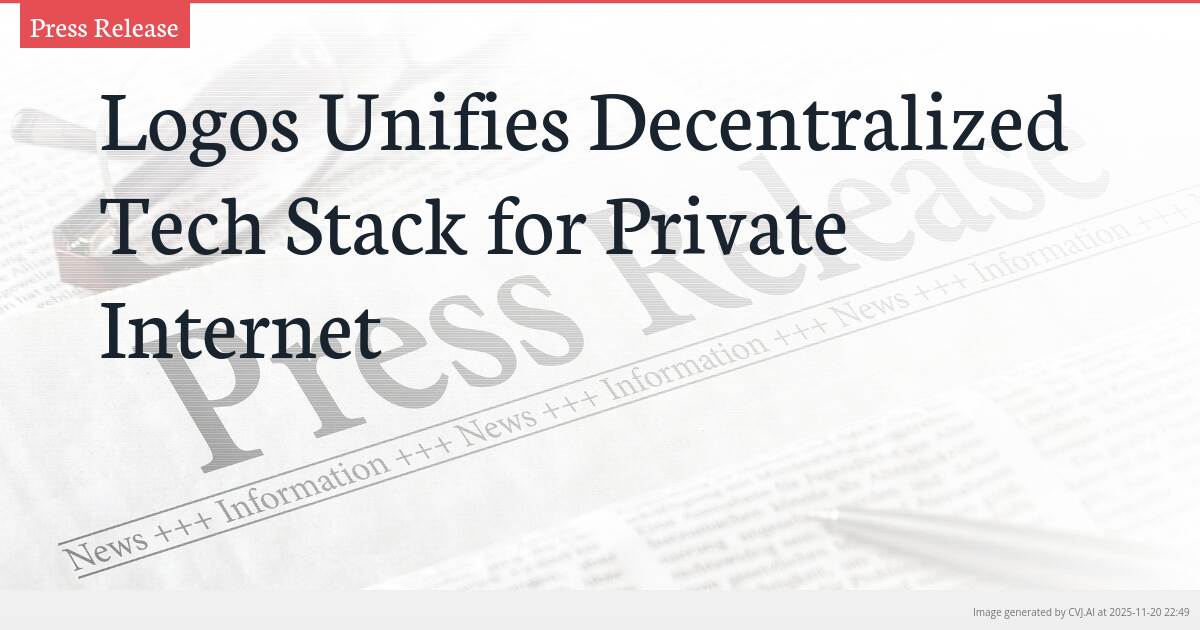Introduction
In a strategic consolidation that marks a significant evolution in decentralized technology, three pioneering projects—Codex, Nomos, and Waku—have unified under the single brand identity of Logos. This integration creates a comprehensive, privacy-focused technology stack designed to build a free and open internet while revitalizing civil society through sovereign digital tools. The move represents a calculated effort to eliminate previous silos and confusion, combining over 200 active contributors, 26 repositories, and 18 global community chapters into one coherent ecosystem where developers can build truly private decentralized applications by default.
Key Points
- Three separate projects (Codex, Nomos, Waku) unified under Logos brand to create integrated decentralized technology stack
- Logos provides modular, plugin-based runtime for developers to build privacy-by-default decentralized applications
- Public testnet planned for 2026 and mainnet for 2027, with node operation rewards for early adopters
The Strategic Unification: From Three Projects to One Coherent Stack
The unification of Codex, Nomos, and Waku under the Logos brand represents a deliberate shift from fragmented development to integrated ecosystem building. For years, these three projects operated independently, each carving its specialized niche: Codex focused on building censorship-resistant, durable storage solutions; Nomos developed a private Layer 1 blockchain for sovereign, resilient coordination; while Waku delivered privacy-preserving, peer-to-peer messaging at scale. Though they shared the overarching goal of creating technology to revitalize civil society, their separate operations created confusion about how these protocols could work together effectively.
According to Jarrad Hope, Co-Founder of Logos, this consolidation represents a fundamental strategic advancement. “Integration unlocks impact,” Hope stated in the announcement. “By unifying the technology stack under the Logos identity, we provide builders and communities with a direct path to a private, sovereign digital life without compromise.” The timing of this unification reflects the maturity each protocol has achieved individually, creating an opportunity to build an ecosystem that delivers greater value than the sum of its parts.
The Logos Technology Stack: Privacy by Default for Developers
The newly integrated Logos ecosystem provides developers with a modular, plugin-based runtime specifically designed for building decentralized applications with privacy as a foundational principle rather than an afterthought. This represents a significant departure from current development paradigms where privacy features are often bolted on as secondary considerations. Developers can now leverage whichever combination of tools best suits their specific needs while maintaining confidence that privacy protections are inherent throughout the technology stack.
The consolidation addresses what had become a critical challenge in decentralized technology development: the difficulty of integrating separate protocols that weren’t designed to work together seamlessly. With Codex’s storage capabilities, Nomos’s consensus layer, and Waku’s messaging infrastructure now unified under Logos, developers gain access to a coherent technology stack that eliminates integration complexities. This streamlined approach enables faster development cycles and more robust application architecture while maintaining the privacy and sovereignty principles that define the movement.
Looking forward, Logos plans to ship what they describe as a “batteries-included” toolset that will enable anyone to build and operate sovereign digital infrastructure from the ground up. Key features will include broad public accessibility from day one, high-quality developer experience with clear documentation, early native applications built for real use-cases, and liquidity pathways with distribution channels that reach beyond technical specialists to mainstream users.
Roadmap and Community Engagement: Building a Movement Beyond Technology
The Logos project has outlined a clear development timeline, targeting a public testnet launch in 2026 followed by mainnet deployment in 2027. This measured approach reflects the project’s commitment to delivering a functional, privacy-preserving network that people can use immediately upon launch. The priority remains on practical utility rather than theoretical promise, with the team emphasizing that their goal is to create technology that serves real-world needs for digital freedom and civil society revitalization.
Beyond the technical roadmap, Logos positions itself as more than just a technology stack—it represents a growing movement for builders, explorers, and dreamers committed to pioneering a new era of digital freedom. With over 200 active contributors and 18 community chapters worldwide, the movement emphasizes grassroots organizing and local engagement. Those interested in joining ahead of the mainnet launch will have opportunities to run nodes and earn rewards as early adopters, creating both technical and economic incentives for community participation.
The ultimate mission of Logos extends beyond technological innovation to what the team describes as restoring agency, trust, and civic power by giving people the tools to explore and innovate using decentralized technology. Through the integrated Logos technology stack, individuals, communities, markets, and institutions will be empowered to operate on a voluntary, privacy-preserving foundation, thereby safeguarding civil liberties and digital freedom in an increasingly centralized digital landscape.
📎 Source reference: cryptopotato.com

